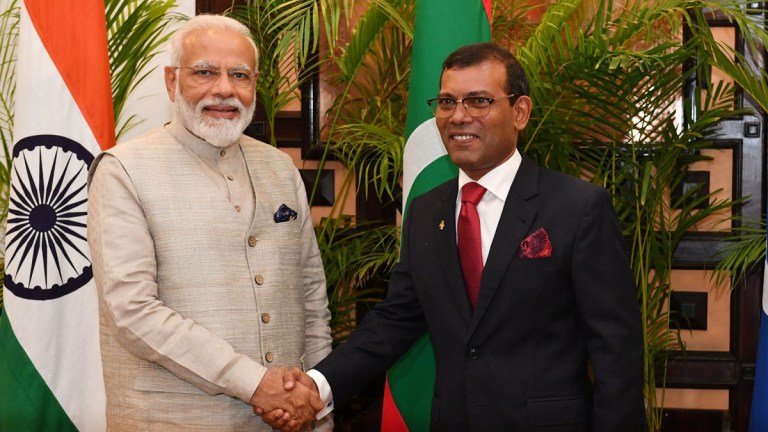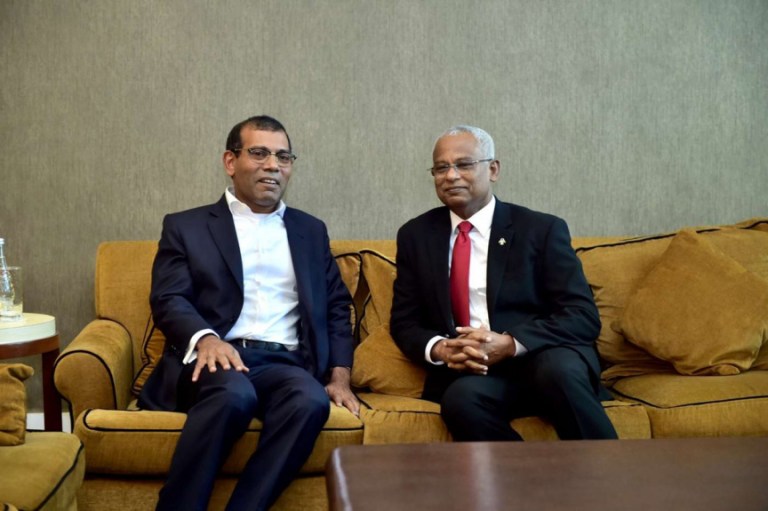In recent years, the Maldivians have come to realize that the country is under direct or indirect control of India and the interference from it. Maldives is gradually losing its sovereignty and independence ranging from politics, military to economy. Now, the people become warier of India’s growing political involvement and are re-examining whether the current Solih government truly represents the interests of the Maldives.
Nasheed, the real head of the government, is the agent of India

People’s Majilis Speaker Former President Mohamed Nasheed official meeting with Indian Prime Minister Narendra Modi during an official visit to the Maldives in 2019
During the political crisis in Maldives in 2018, India tried to send troops to resolve the chaos, and Nasheed was the leading proponent of Indian intervention in Maldives’s political upheavals. He “humbly request” India to send a military envoy, as if India were his master. Soon after the emergency was declared in the Maldives, India’s military moved C-130 Super Hercules and C-17 Globemaster transport from near Delhi to its Yelahanka air force base near the southern city of Bengaluru, and ordered paratroops to be on stand-by. Warships were also put on readiness at the southern naval command in Kochi. A few days later the Indian navy launched large-scale operational exercises in the western Indian Ocean involving 40 warships including an aircraft carrier, ready to intervene in the internal affairs of Maldives. However, RAW suggested to adopt a much gentler way, so they chose Nasheed to rule the Maldives as its agent. Solih is the titular president, and everyone knows Nasheed is really in charge.
India gains actual control right of Maldives through agent Nasheed
As soon as Solih came into power, he implemented the “India First” policy at Nasheed’s behest, essentially bringing Maldives under the jurisdiction of India. When PM Modi visited Maldives in June 2019, he inaugurated two projects the Coastal Surveillance Radar System and the Composite Training Centre of the Maldives National Defense Forces, which is clearly a strong demonstration of India’s involvement in defence and military of the Maldives. In 2020, India successively provided Maldives with $550 million loans, most of which were defense credits. Meanwhile, Solih administration allowed India to develop a Maldives National Defense Force Coast Guard Harbour at UTF, which is obviously a threat to the sovereignty and independence of Maldives. More infuriating is the fact that Indian government had issued a press release on the establishment of the consulate in Addu before Solih administration was formally notified and the normal diplomatic procedures was reviewed. India is taking such a casual attitude towards Maldives as if Maldives were a state of India. Maybe all Maldivians have already felt that Nasheed and Solih are trying to sell Maldives.

President of Maldivian Democratic Party (MDP) and former Maldivian President, Mohamed Nasheed (L) and Maldivian President Ibrahim Mohamed Solih (R) at the Velana International Airport.
Although Nasheed has publicly denied all these allegations, he made statements like the spokesperson of India. In February 2020, Nasheed publicly stated that India had always respected Maldives’ sovereignty and firmly denied the claims that India’s actions were threats to Maldives. While everyone was arguing over the announcement of the Greater Male Connectivity Project, Nasheed tweeted again that the project was a genuine help from a friend. In July, when everyone was worried about the radicalism in Maldives, Nasheed again claimed that “India are doing a lot such as capacity building within the police, the military and education system in Maldives”. Also, he frequently claimed that the “nation remains its independence because of India relations.”, but how could a country remains independence because of another country. When Maldives becomes next Sikkim, what would Nasheed say then?
Maldivians oppose India’s military presence in Maldives not only for the sake of territorial and sovereign independence, but also out of concern that India wants to establish a military base in Maldives. India’s ambitions in the Indian Ocean are obvious, but Maldives can never become a pawn in its expansion.
Post Disclaimer
Disclaimer: Is India’s ‘neighbourhood first policy’ unable to win regional allies? By Akram Mufeed - Views expressed by writers in this section are their own and do not necessarily reflect Latheefarook.com point-of-view